Super User
Valmet to supply automation technology to Lemit Papers in Morbi, India
Valmet will supply a mill wide Valmet DNA Automation System with the new Valmet DNA User Interface and consistency measurements package to Lemit Papers in Morbi, India. The target of the investment is to ensure a smooth start-up, to optimize the equipment efficiency and to achieve premium board quality.
The order was included in Valmet's orders received of the first quarter 2022. The value of the order is not disclosed. The delivery is scheduled for the end of the second quarter 2022.
The order is a follow-up of the Valmet IQ Quality Control System order to Lemit’s board machine. The solution will provide reliable and accurate measurements and controls for various locations in secondary fiber treatment in pulp mill and board making line.
“We at Lemit Papers strive for top notch technology and want to invest in advanced and proven technologies. We chose Valmet based on the market-wide positive reviews and the local presence. The cooperation with Valmet on the automation system will increase operational reliability and ensure high quality of our duplex board”, says Mr. Praful Detroja, Chief Managing Director, Lemit Papers LLP.
“We are delighted to supply the Valmet automation solutions to Lemit Papers. After having executed several similar projects in India, our references and local services helped to secure this order”, says Ramesh Chandra, Solution Sales Manager, Asia Pacific, Automation Systems business line, Valmet.
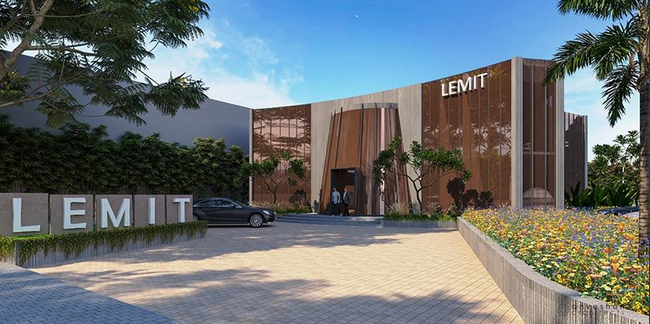
Technical details about the delivery
Valmet’s delivery includes Valmet DNA Automation System, Valmet DNA User Interface, twelve Valmet Blade Consistency Measurements (Valmet SP), eight Valmet Optical Consistency Measurements (Valmet OCR) and one Valmet Optical Low Consistency Measurement (Valmet LC). The distributed control system (DCS) will cover the pulp mill and board making line. All controls are in one platform that allows users an easy access to the data as well as efficient collaboration. The consistency measurements offer reliability and accuracy for the paper quality control.
Together with the Valmet IQ Quality Control System (QCS), providing accurate basis weight and moisture measurements for precise multivariable MD controls, the automation system will help to improve both the operation efficiency and the paper quality.
Information about Lemit Papers
Lemit Papers LLP is a part of the L group of Companies, established in 2021. Lemit Papers has advanced machinery with future-proof automation. The production capacity is 450 TPD. Lemit Papers’ product portfolio will include grey and white back duplex board with premium and standard grade HWC coating, available in 200 to 450 GSM in thickness. Lemit Paper will set a new benchmark in quality with readiness to serve the domestic as well as the international markets. For more information, please visit lemitpapers.com.
For further information, please contact:Pravin Tripathi, Senior Manager, Solution Sales, Asia Pacific, Automation Systems business line, Valmet, This email address is being protected from spambots. You need JavaScript enabled to view it.
Valmet is a leading global developer and supplier of process technologies, automation and services for the pulp, paper and energy industries. With our automation systems and flow control solutions we serve an even wider base of process industries.
We aim to become the global champion in serving our customers. Our 17,000 professionals work close to our customers and are committed to improving our customers’ performance – every day.
The company has over 220 years of industrial history and a strong track record in continuous improvement and renewal. In 2022, a major milestone was achieved when the flow control company Neles was merged into Valmet. The combined company’s net sales in 2021 was approximately EUR 4.5 billion based on the respective company figures.
Valmet’s shares are listed on the Nasdaq Helsinki and the head office is in Espoo, Finland.
Follow us on valmet.com
Simplifying through objective sustainability reviews
Many companies are now flooded with questions and surveys from their customers and suppliers about sustainability. When Holmen Iggesund discovered EcoVadis, they saw an opportunity to simplify reviews and increase transparency around sustainability.
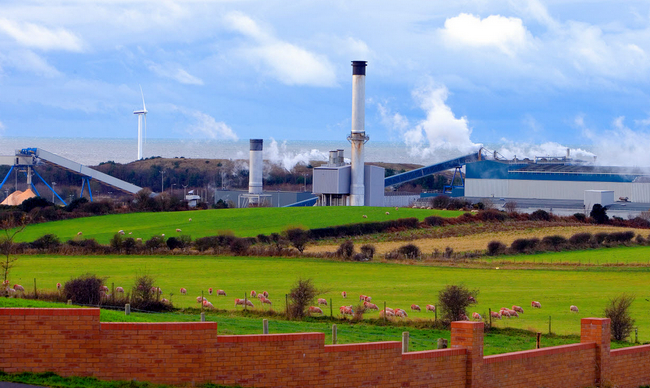
EcoVadis is a fast-growing web-based platform where customers and suppliers can exchange sustainability information. Those who report on the platform must answer around 250 questions on the environment, working conditions, business ethics and procurement. All answers must be substantiated with the relevant documents and answers are third-party reviewed and evaluated.
“Holmen Iggesund has been reporting on EcoVadis’ system for over five years and the platform increases transparency through an easier way to exchange sustainability information between companies. Today, over 50 customers and suppliers can see in detail how our sustainability is ranked by third-party auditors, and this has simplified our daily work,” says Johan Granås, Sustainability director at Holmen Iggesund.
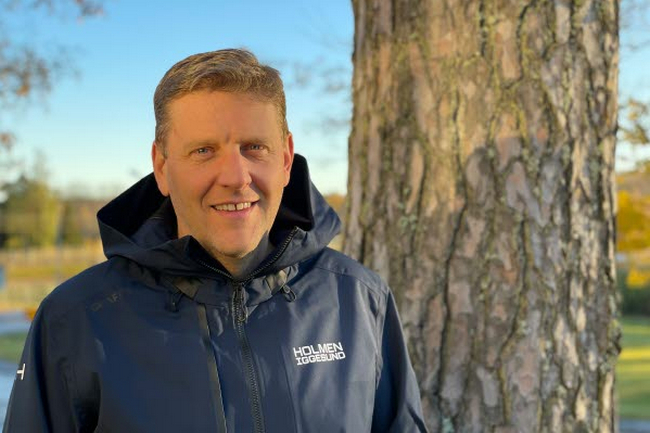 “The demand for transparency and the increasing scope of sustainability information requested by customers and other stakeholders requires better systems to work well.", says Johan Granås, Sustainability director at Holmen Iggesund.
“The demand for transparency and the increasing scope of sustainability information requested by customers and other stakeholders requires better systems to work well.", says Johan Granås, Sustainability director at Holmen Iggesund.
Platinum for both of Holmen Iggesund’s mills
This year, Holmen Iggesund's two mills, in Iggesund and Workington, have again been awarded the highest level, Platinum, which means that they belong to the very highest percentile of all audited companies.
"Of course, it’s satisfying to maintain this level. It is important that we constantly improve because we see so many challenges for society related to the environment and sustainability, not just the climate. We are extra proud to be a heavy manufacturing industry with this high rating. When we are compared to other companies, this also includes banks, insurance companies and consulting companies with significantly lower direct environmental impacts than us,” emphasises Johan Granås.
In addition to the customers who have ongoing access to the platform, it is possible to export reports in varying degrees of detail that can be used for questions from other stakeholders. The system is not only used to share sustainability information - in the Holmen Group it is also used to collect sustainability information with the intention of evaluating suppliers.
“Our work with the EcoVadis survey is not just a service to customers and partners. It also provides a regular check of the status of our sustainability agenda and gives us ideas on how we should prioritise sustainability work in the future,” concludes Johan Granås.
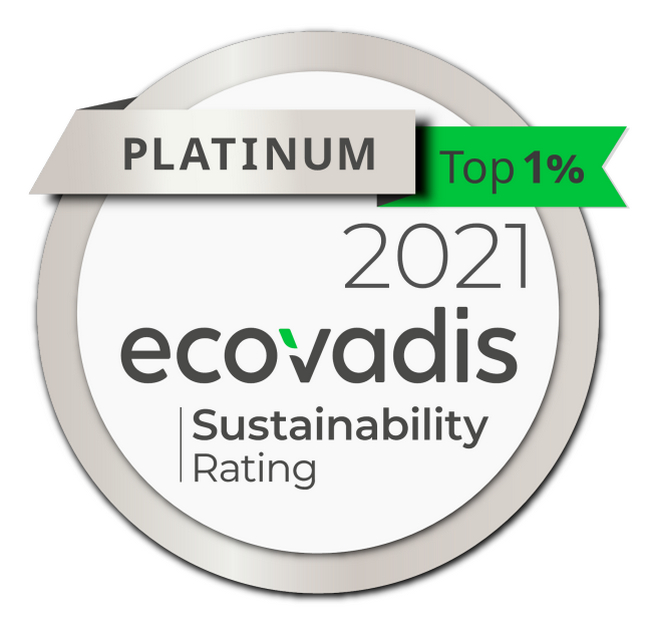
ANDRITZ to upgrade wet section of special paper machines at Papierfabriek Doetinchem, Netherlands
International technology group ANDRITZ has received an order from Papierfabriek Doetinchem, Netherlands, to upgrade the wet sections of its PM1 and PM3 special paper machines.
The start-ups are scheduled for 2022.
The aim of the investment is to improve the paper quality and provide the basis for a possible capacity increase. ANDRITZ will deliver ModuScreen HB dilution headbox screens, PrimeFlow AT headboxes with PrimeProfiler F dilution control, and pumps for both machines.
The proven ModuScreen HB ensures efficient and almost pulsation-free screening at low energy consumption thanks to the design following the inflow principle and to the screen’s unique accept chamber design.
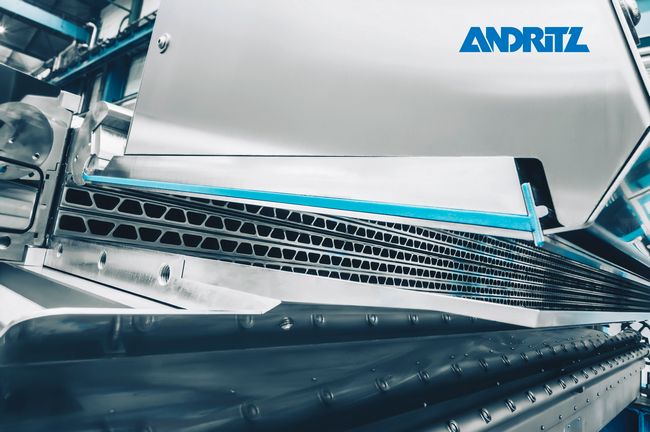
The PrimeFlow AT headbox has a patented “Accelerating Tube” design with unique, nested trapezoid outlets. It features a rugged design structure, sheets in the nozzle for turbulence control, and capacity for high-resolution dilution profiling. This provides excellent jet quality, fiber dispersion and fiber orientation control over a wide range of grades and speeds.
The mill produces 70,000 t/a of paper for a broad range of applications. All products are made from first-class recycled fibers and can also be recycled again. They are biodegradable and standard PEFC certified.
ANDRITZ GROUP
International technology group ANDRITZ offers a broad portfolio of innovative plants, equipment, systems, services and digital solutions for a wide range of industries and end markets. ANDRITZ is a global market leader in all four of its business areas – Pulp & Paper, Metals, Hydro, and Separation. Technological leadership, global presence and sustainability are the cornerstones of the group’s strategy, which is focused on long-term profitable growth. The publicly listed group has around 26,800 employees and over 280 locations in more than 40 countries.
ANDRITZ PULP & PAPER
ANDRITZ Pulp & Paper provides sustainable technology, automation, and service solutions for the production of all types of pulp, paper, board and tissue. The technologies and services focus on maximum utilization of raw materials, increased production efficiency, lower overall operating costs as well as innovative decarbonization strategies and autonomous plant operation. Boilers for power generation, flue gas cleaning systems, various nonwoven technologies, panelboard (MDF) production systems, as well as recycling and shredding solutions for numerous waste materials also form a part of this business area. State-of-the-art IIoT technologies as part of Metris digitalization solutions complete the comprehensive product offering.
The key pulp mill technology and automation delivered by Valmet successfully in operation at the new LD Celulose pulp mill in Brazil
LD Celulose S.A, a joint venture between the Austrian company Lenzing and the Brazilian company Dexco, invested about USD 1.3 bn in a 500,000 tonne/year dissolving wood pulp mill in the Triângulo Mineiro region in Brazil. Valmet delivered the key process islands and integrated automation solutions for the mill. The equipment operations and the production ramp-up in the new mill have now successfully started.
Valmet delivered the project with extended scope of supply. Detailed engineering for the project was started in the beginning of 2020 and the installation works at the site in the beginning of 2021.
“Our new mill brings a positive socioeconomic impact throughout the region. The dissolving pulp is a key raw material for manufacturing Lenzing’s wood-based textile and specialty fibers. This mill is among the most productive and energy-efficient mills in the world. We have adopted the most advanced technologies in the mill, not only in the sustainable production process, but also in the solutions that seek to reduce emissions to the environment. We are very happy that despite the outside challenges we have been able to follow our schedule”, states Luís Künzel, CEO of LD Celulose.
“This project is an excellent reference of dissolving pulp technology and our green field pulp mill delivery capability. Almost everything in this project was implemented during the global Covid-19 pandemic. We have been working remotely in engineering, project management and even in factory acceptance test for the automation system. This has required a lot of trust and communications between the Valmet and LD Celulose teams and special attention to planning and scheduling. I’m pleased to see how our teams have reached this important milestone of starting the production at the site”, says Bertel Karlstedt, Business Line President, Pulp and Energy, Valmet.
“The project execution was a success even in such challenging times which demonstrates our capacity and competence to deliver the right quality at the right time. The cooperation both with Valmet Brazilian and Nordic teams and our customer has made it possible. In addition to leading process technology solutions, the project features an advanced automation system supported with analyzers, Valmet Industrial Internet solutions and a mill-wide Operator Training Simulator”, says Celso Tacla, Area President, Valmet South America.
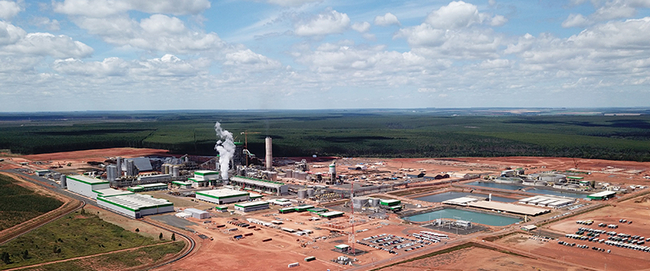
Details of Valmet’s delivery
Valmet’s complete delivery included a fiber line, a pulp drying and baling line, an evaporation plant, ash crystallization, a white liquor plant, mill-wide automation system, analyzers and training simulators for all process areas.
The fiber line features Valmet TwinRoll technology for high washing efficiency with low chemical and water consumption. The pulp drying and baling line is designed to handle the special requirements of dissolving pulp in an energy efficient way and ensures high-quality pulp and easy operation with the support of the Valmet Quality Control System.
The evaporation plant features Valmet Tubel technology for high availability and produces clean condensate quality for 100% reuse in the mill. The white liquor plant includes recausticizing and lime kiln and is designed for high reliability and less maintenance. The Valmet Ash Crystallizer has a capacity of 300 tons of ash per day and will recover mill chemicals and remove non-process elements, primarily chloride and potassium, from the mill’s liquor cycle.
The mill-wide automation system, Valmet DNA, stands out with its innovativeness being built on the latest virtualization technology, allowing a completely new way to operate the mill and integration with analyzers.
Valmet Operator Training Simulator (OTS) will be used in all process islands, from the beginning to the end of production, with a total of 14 process areas. An innovative fact of the project is that its wood handling area is the first in Brazil to use OTS technology. Another highlight is the presence of simulators for the areas of water treatment, water treatment for boilers, effluent treatment and turbines, commonly little explored in the OTS. This demontrates the commitment of LD Celulose to implement for more efficient, optimized processes focused on the safety and excellence of its operational team.
About the customer LD Celulose S.A.
LD Celulose S.A. is a joint venture between the Austrian Lenzing and the Brazilian Dexco, setting up one of the largest dissolving wood pulp mills in the world. The dissolving wood pulp produced in LD Celulose will be used in the textile industry, generating fabrics with innovation, sustainability and high technology.
Valmet is a leading global developer and supplier of process technologies, automation and services for the pulp, paper and energy industries. With our automation systems and flow control solutions we serve an even wider base of process industries.
We aim to become the global champion in serving our customers. Our 17,000 professionals work close to our customers and are committed to improving our customers’ performance – every day.
The company has over 220 years of industrial history and a strong track record in continuous improvement and renewal. In 2022, a major milestone was achieved when flow control company Neles was merged into Valmet. The combined company's net sales in 2021 was approximately EUR 4.5 billion based on the respective company figures.
Valmet’s shares are listed on the Nasdaq Helsinki and the head office is in Espoo, Finland.
Follow us on valmet.com
ABB expands KPM portfolio to include long-distance, single calibration break detection for all grades and colors
ABB is launching their new KPM KB2 Ranger Model, a sheet break detection device that is invulnerable to paper jams, color and grade changes for the highest uptime with the lowest required maintenance.
- ABB’s new KB2 Ranger Model delivers unique, long-distance break detection from the side of the paper web providing continuous, trouble-free operation
- Latest KPM detection device includes innovative RGB break profile method to reduce false positives
- Simple, one-button calibration removes the need for complicated, grade-specific settings
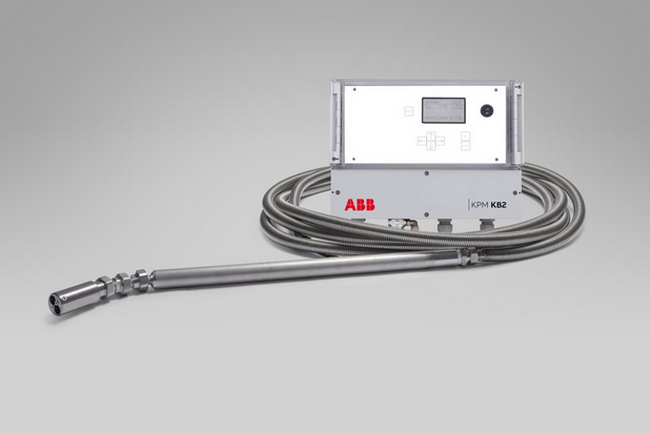
As the latest addition to ABB’s industry-leading KPM Sheet Break Detector portfolio, this non-contact optical sensor will prove particularly important for paper or board producers making frequent grade changes or colored papers. The single, one-button calibration removes the need for complicated, grade-specific settings, while the RGB break profiling method reduces false positives and automatically updates for more robust detection over time.
The KPM KB2 Ranger model offers a longer measurement distance – up to 1.5 meters – and side installation to keep the sensor head outside the machine. It can provide reliable break detection in all configurations, such as against felt, wire or cylinders, and its freely adjustable sensor head is able to detect breaks from any angle. This removes the possibility of paper getting stuck on the sensor head, enabling higher reliability and accuracy across all paper and board grades, regardless of color.
While the sensor head can withstand high temperatures, the electronics unit is mounted outside the machine hood using fiber optic cables, preventing the electronics from being affected by dirt, steam or temperature and maintaining high reliability even in a high humidity environment.
Unlike comparable solutions that require in-machine installation, ABB’s KPM KB2 Ranger model augments the current offering to deliver higher uptime and reduced unplanned downtime. It requires minimal, if any, maintenance and cleaning due to its air-purged sensor that keeps the unit clean for continuous and trouble-free operation.
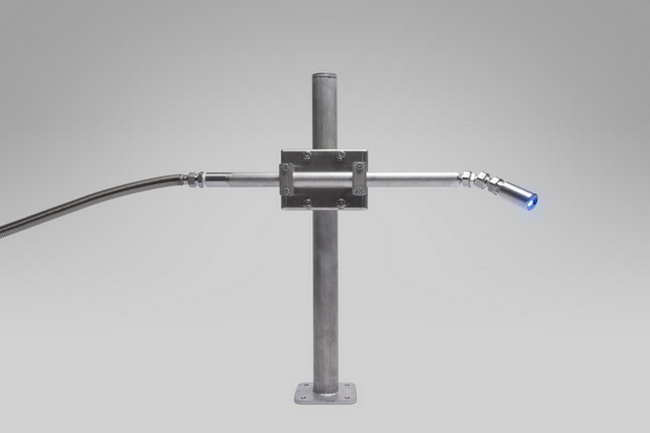
“Our KPM Sheet Break Detector is recognized as the best on the market and the proven choice for installations in harsh environments or where space is limited,” said Karin Hermansson, Product Line Manager, ABB. “We are pleased to unveil the new KB2 Ranger Model to offer additional options for mills facing frequent grade changes or color-related issues, while proving our commitment to continual innovation surrounding mill optimization solutions.”
KB2 is applicable globally across paper, tissue, board and pulp machines, and can be used on press or drying sections.
ABB (ABBN: SIX Swiss Ex) is a leading global technology company that energizes the transformation of society and industry to achieve a more productive, sustainable future. By connecting software to its electrification, robotics, automation and motion portfolio, ABB pushes the boundaries of technology to drive performance to new levels. With a history of excellence stretching back more than 130 years, ABB’s success is driven by about 105,000 talented employees in over 100 countries. www.abb.com
ABB’s Process Automation business is a leader in automation, electrification and digitalization for the process and hybrid industries. We serve our customers with a broad portfolio of products, systems, and end-to-end solutions, including our # 1 distributed control system, software, and lifecycle services, industry-specific products as well as measurement and analytics, marine and turbocharging offerings. As the global #2 in the market, we build on our deep domain expertise, diverse team and global footprint, and are dedicated to helping our customers increase competitiveness, improve their return on investment and run safe, smart, and sustainable operations. go.abb/processautomation
Stora Enso divests its sawmills and forest operations in Russia
Stora Enso has entered into an agreement to divest its two sawmills in Russia. The Company’s Nebolchi and Impilahti sawmills will be divested to local management. In addition, the divestment includes Stora Enso’s Russian forest operation which through its harvesting supplies wood to the sawmills.
Stora Enso’s assessment is that due to the uncertainties in the Russian market, local ownership and operation can provide a more sustainable long-term solution for these business operations and the employees working there.
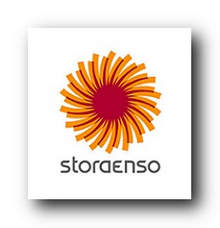 The transaction is, pending necessary approvals, expected to be concluded within Q2 2022 and will have no material impact on Stora Enso’s annual sales and Operational EBIT. Due to decreased business prospects on these businesses, an impairment loss of EUR 70 million has been recorded in the first quarter result. The additional loss on the transaction under IFRS will be approximately EUR 60 million, consisting mainly of currency translation adjustments to be recorded at the closing date. The expenses are considered as items affecting comparability.
The transaction is, pending necessary approvals, expected to be concluded within Q2 2022 and will have no material impact on Stora Enso’s annual sales and Operational EBIT. Due to decreased business prospects on these businesses, an impairment loss of EUR 70 million has been recorded in the first quarter result. The additional loss on the transaction under IFRS will be approximately EUR 60 million, consisting mainly of currency translation adjustments to be recorded at the closing date. The expenses are considered as items affecting comparability.
The sawmill sites are located in Novgorod and Karelia employing approximately 330 people and have a total annual capacity of 350,000 m3 of sawn timber, including 55,000 m3 of processed timber and 65,000 tonnes of pellets. Stora Enso’s Russian forest operations employs approximately 170 people and manages long-term harvesting rights for around 370,000 hectares.
Stora Enso announced on 2 March 2022 that it would stop all production and sales in Russia until further notice. The Group is in a process to find a sustainable solution for the future of its three packaging plants in Russia.
Part of the global bioeconomy, Stora Enso is a leading provider of renewable products in packaging, biomaterials, wooden construction and paper, and one of the largest private forest owners in the world. We believe that everything that is made from fossil-based materials today can be made from a tree tomorrow. Stora Enso has approximately 22,000 employees and our sales in 2021 were EUR 10.2 billion. Stora Enso shares are listed on Nasdaq Helsinki Oy (STEAV, STERV) and Nasdaq Stockholm AB (STE A, STE R). In addition, the shares are traded in the USA as ADRs (SEOAY). storaenso.com/investors
PFNonwovens chose A.Celli technology for its new investment in North America
The production line, developed with Reicofil R5 technology, is equipped with our solutions like:
- E-WIND® WAVE Master Roll winders
- E-WIND® SUPER SONIC slitter rewinders with COREMATIC EVO technology
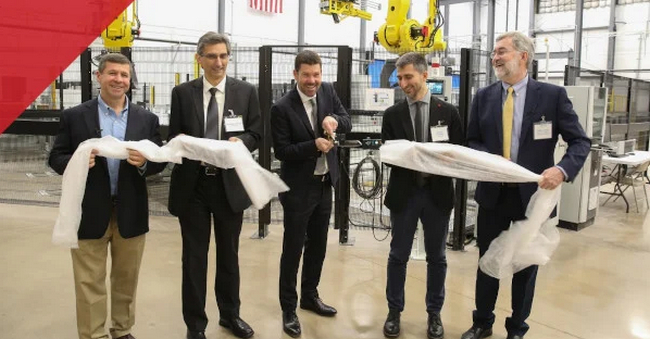
All this enhanced by our R-WAY® solution for automatic roll handling and packaging equipped with our Label Verification System, an upgrade for packaging systems with the objective to verify, by reading the labels applied to the reels and bundles, the consistency between the processes carried out by the packaging line and the actual end result of the process in terms of correct composition of each bundle.
Having PFNonwovens as a partner makes us more and more proud of our technology dedicated to the nonwovens sector.
“We are the first to invest in the latest R5 machinery in the US. This investment, in combination with our unique proprietary technology, allows us to produce consumer-preferred ultra-high loft, soft and textured nonwoven fabrics. This solidifies PFN’s position as a global leader in the production of innovative spunmelt nonwoven fabrics.” said Shane Vincent, PFN Chief Commercial Officer.
PFNONWOVENS – COMPANY PROFILE
PFNonwovens is a leading global producer of customized nonwoven fabrics for innovative products across multiple key markets (Baby Care, Medical, Adult Incontinence and Fem Care). The company is headquartered in Prague, Czech Republic, and operates five production plants worldwide: two in the Czech Republic, and one each in the United States, Egypt, and South Africa.
EARTH DAY 2022 - A climate case for wood, pulp and paper
It’s fair to assume that most people, when considering ways to fight climate change, don’t immediately think of forestry. But there is a unique climate case for sustainable wood – it is the only material that can naturally and significantly decarbonise our planet by driving down demand for illegally harvested wood, and provide functional alternatives to non-renewable materials that have significantly higher environmental footprints.
“Debunking the notions that industrial forestry is a destructive force isn’t easy, but the global forestry and forest products sector continues to tackle these misconceptions,” says Jane Molony, executive director of the Paper Manufacturers Association of South Africa (PAMSA). “We stand firm in the fact that a holistic, sustainable and circular forest bioeconomy is essential to fighting climate change.”
To understand why paper and wood products are vital to a lower carbon footprint, we can borrow from Nobel Prize-winning physicist Richard Feynman’s assertion that trees don’t grow from the ground, they grow from the air. The Food and Agriculture Organisation’s (FAO) Forest Resource Assessment 2015 states that world forests were sequestering close to 300 Gigatonnes of carbon.
Commercial forestry achieves this both through growing trees, which absorb carbon dioxide, but also by harvesting them at the right time, with carbon being stored in harvested wood products.
"Harvesting makes space for younger trees that take up more carbon dioxide than their older counterparts," says Molony, adding that the climate benefit is thus evident in two places. "Through a stable and increasing carbon storage in the forest itself, and in the forest products."
Molony notes, "Many vilify the forestry sector without understanding its renewability and circularity, and fail to recognise its ability to store carbon and crucially, how it helps to cut back on fossils." That said, feforestation, however, must be reduced in the context of indigenous or tropical forests, and illegal wood trade.
Climate change is not caused by people in developing countries felling trees. Instead, it’s caused by high- and middle-income countries burning fossils. We need to focus on displacing these fossil emissions by using wood’s inherent power as the ultimate renewable.
"We do this, first, by increasing uptake of wood products in traditional markets. Organisations like FAO recognise wood as a viable substitute for carbon-intensive materials such as steel and concrete in construction, and plastic and textiles in everyday applications. It is also present in everyday life in the form of paper, tissue, packaging and cellulose products," comments Molony.

"Second, we need to explore the potential of wood fibre and process waste in new applications, such as the use of lignin for batteries for electronics, or extracting sugars and hemicellulose for bio-based chemicals.
"Third, we need to ensure we have enough trees to supply the increased demand for wood-based products."
South African ecosystems are not tree dominated. "We only have half a million hectares of indigenous forests, which are fragmented and occur along the south and eastern coastal inland mountains. Importantly, they are protected."
South Africa plants fast-growing exotic tree species to produce timber, and currently have 1.2 million hectares of these industrial plantations. Also, 25% of forestry owned land is not planted with trees, but home to wetlands, grasslands, indigenous forests and area of high conservation value.
Tree breeding and sustainable intensification (planting more productive trees on less land) are actively being practised in South Africa. The breeding, selecting and testing of new hybrid varieties is aimed at increasing pulp yield per hectare across diverse climatic regions. Trees are also bred for superior wood properties and resistance to biotic and abiotic threats including frost, drought, pests and diseases.
"As a sector, we can demonstrate that having commercial plantations has prevented the increased use, destruction, and degradation of natural forests. This speaks to the heart of the way South African forests are managed – sustainably and responsibly," suggests Molony.
It also speaks to the fact that the sector doesn’t harvest swathes of trees, leaving the land desolate for years. Forestry companies have nurseries growing more trees, that will take the place of those gone before, most often at a ratio of 2:1. Even harvesting residues are left behind to enhance soil fertility and protection.
Finally, harvesting wood makes the circular bio-economy possible. "If we don’t have sustainably grown and sourced wood, we can’t replace fossil-based products and do all of the things that climate adaptation demands."
Greycon Provide Significant Performance Improvements and Productivity Gains For a Leading Paper Manufacturer
Incorporated in 1996, Bahl Paper Mills has emerged as one of the leading manufacturers of industrial packing papers, producing an extensive range of environmentally friendly graded paper. All the firm’s products are manufactured from 100% recycled wastepaper and include 180 to 600gsm duplex board, 18 to 110gsm poster paper and 18 to 160gsm kraft paper. The business produces nearly 300 tonnes of paper every day.
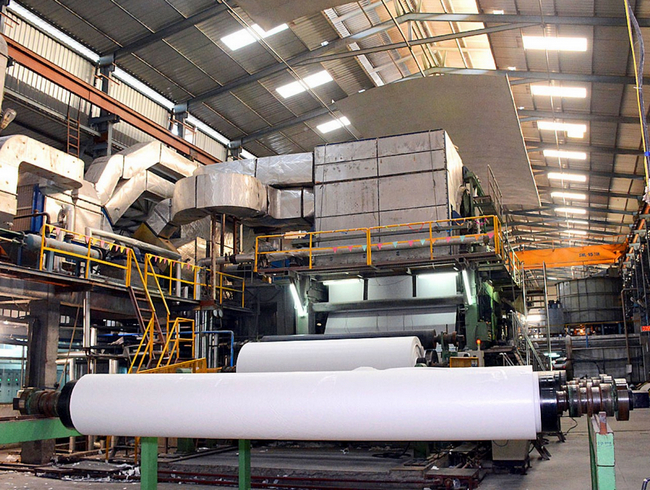
The senior team at Bahl wanted to improve productivity and machine efficiency, as well as reduce waste. One way to achieve this was to maximize the deckle width utilization of the papermaking machine. Bahl was keen to improve the productivity of the winders and sheet cutters while ensuring that the selected solution could be effectively integrated into the factory’s existing systems and processes. After an initial conversation between Greycon and Bahl, Greycon recommended their tried and tested trim optimization solution, X-Trim.
Greycon’s X-Trim provides the production planners at Bahl Paper with an extensive range of options to address the challenges/improvement opportunities they had identified. X-Trim was implemented with specific modules that offered their business a range of optimizers capable of managing reel and sheet orders in a single model. Leveraging the combination of optimizers and other features of the application, Bahl Paper has been able to increase the average deckle width for the jumbo, leading to higher machine efficiency and throughput. Alongside this, Bahl was able to increase the diameter of reels being fed to cutters and decrease the number of knife changes, both leading to higher productivity.
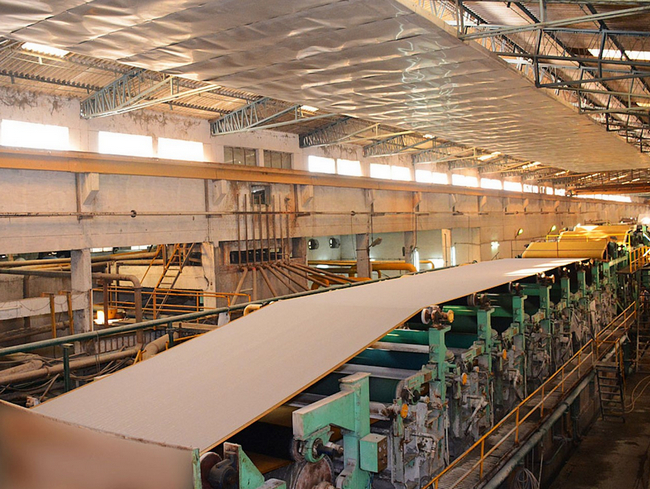
The Bahl team have been extremely impressed with X-Trim. The system’s highly intuitive user interface is a major step forward from the manual processes that were being used previously.
Overall operational planning is much improved, creating additional time for planners to deliver other value-added activities to support business growth.
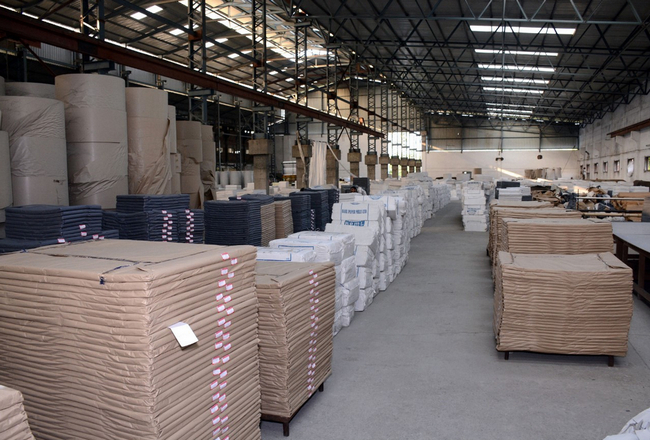
“It did not take us long to decide that X-Trim was the solution that would completely satisfy our needs. The prompt response from the Greycon team helped lay to rest any concerns that we had. It has been a great investment, with significant savings.”
Naveen Jhanji, Managing Director.
About Greycon
Greycon is the leading provider of supply chain planning & optimization, production planning & detailed scheduling, trim optimization and manufacturing execution systems for roll-based & flat
sheet industries; specifically, the paper & board, film & flexible packaging, nonwoven, converting and metal industries.
Established in 1985, over 500 plants in 43 countries use our solutions. Our extremely skilled and talented employees cover 15 languages across our worldwide operation. www.greycon.com
Valmet to deliver a wash press to Nippon Paper Industries Co. Ltd. Akita mill in Japan
Valmet will deliver a TwinRoll™ Evolution wash press and a screw conveyor to Nippon Paper Industries Co. Ltd. Akita mill. The start-up is scheduled for end of May 2023.
The order is included in Valmet’s orders received of the first quarter 2022. The value of the order will not be disclosed.
“Our group is making efforts to reduce greenhouse gas (GHG) emissions and environmental impact in order to achieve a business model aimed at carbon neutrality. For the replacement of our pulp washer, we are determined that Valmet TwinRoll Press is the most advantageous solution. We decided to adopt them based on a comparative study of different washer types on their actual performance in Japan. Akita Mill expects the new wash press to save steam by increasing the concentration of lean black liquor, to enhance quality by improving the cleaning process, and to lower the wastewater load,” says Mr. Nakamura, Senior Technical Manager, Plant Engineering Department, Technical & Engineering Division.
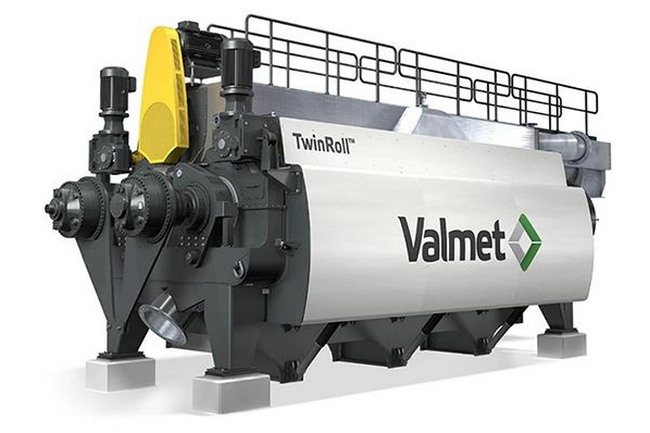 Valmet TwinRoll™ Evolution
Valmet TwinRoll™ Evolution
“We are very pleased that we have been trusted to deliver a new wash press to the Nippon Paper mill in Akita. In return, our equipment will increase performance and sustainability for years to come,” says Joel Engman, Sales Manager, Pulp and Energy business line, Valmet.
Information about Valmet’s delivery
Valmet’s scope of supply includes the fifth generation TwinRoll™ Evolution wash press, a screw conveyor, erection supervision and start up services. The new wash press will replace an existing wash filter. Valmet washing technology will lower wash water consumption and increase the washing efficiency compared to the system in place today.
Information about the customer Akita Mill, Nippon Paper Industries Co., Ltd.
Nippon Paper Industries group provides a wide range of products that help create a recycling-oriented society by maximizing the use of renewable wood resources and using diverse technologies and know-how to generate stable profits and achieve valuable lifestyles and cultural development.
The main business activities include the production and sale of pulp and paper, paperboard, liquid paper containers, DP and chemical products, functional films, household paper, specialty paper, wood business, and energy business. Since its founding in 1949, Nippon Paper Industries has developed into one of the world's leading paper companies with 16,000 employees and sales of over 1 trillion yen.
Akita Mill is one of the group’s leading production mills for paper, paperboard, and pulp.
Valmet is a leading global developer and supplier of process technologies, automation and services for the pulp, paper and energy industries. With our automation systems and flow control solutions we serve an even wider base of process industries.
We aim to become the global champion in serving our customers. Our 17,000 professionals work close to our customers and are committed to improving our customers’ performance – every day.
The company has over 220 years of industrial history and a strong track record in continuous improvement and renewal. In 2022, a major milestone was achieved, when flow control company Neles was merged into Valmet. The combined company net sales in 2021 was approximately EUR 4.5 billion based on the respective company figures.
Valmet’s shares are listed on the Nasdaq Helsinki and the head office is in Espoo, Finland.
Follow us on valmet.com
